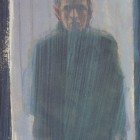Due Foscari 1993Scottish Opera
Read more about the opera Due Foscari
During his years with Welsh National Opera, Richard Armstrong showed himself to be a natural Verdian. Not only did he conduct excellent accounts of most of the mature works, but he also dipped into the treasury of relatively little known early pieces, supplementing the familiar Nabucco and Macbeth with excellent stagings of Ernani and I masnadieri. With the exception of the excellent Pountney Macbeth, Scottish Opera had ignored this field. It was thus no great surprise when one was scheduled for the 1993 Edinburgh Festival. While The Two Foscari may not have been the most obvious candidate for revival, it is undoubtedly tuneful and dramatically effective. It had a further advantage in being based on a drama by an indisputably great poet, Lord Byron, who, if perhaps not a great dramatist, still had very strong connections with Scotland.
The production was launched as a collaboration with Covent Garden, the Royal Opera having decided on an ambitious - as it turned out over-ambitious - scheme to perform all the master's works in the years leading up to his centenary in 2001. In the event, this production fell a bit flat, and was never presented in London. The staging was uninteresting - all dull grey walls and dour reddish costumes, with minimal local colour. Opening night was not helped by the illness of the lead baritone, and the newly-introduced tenor had a powerful voice and little sense of style either as singer or actor. The good features were provided by the expected rousing and red-blooded elements of conductor, orchestra and chorus. a The other positive featuress included the promising young bass as a smoothly villainous Loredano, and especially, an excellent Bolshoi soprano as Lucrezia, just as good in Verdi as she had seemed earlier in the year in Puccini.
Opera at the 1993 Edinburgh Festival
The 1993 Festival saw an interesting concentration on Verdi operas, getting under way with Scottish Opera's first attempt at an early, pre-Macbeth, work in I due Foscari. It immediately joined the company's winter season line-up. Their new musical director, Richard Armstrong, also returned at the end of the Festival with his former colleagues, Welsh National, and their superb Peter Stein production of the final masterpiece, Falstaff. Between these, the Festival gave a concert performance, very well cast, of Verdi's first surviving opera, Oberto.
A second theme at this Festival was an attempt to juxtapose the works of two masters, Schubert and Janáček. Opera was, inevitably, a difficult area in which to achieve this, but a fascinating concert evening was compiled in the Usher Hall. It combined Schubert's unstageable (no surviving dialogue) Die Freunde von Salamanka with Janáček's first opera, Šárka.
Performance Cast
- Francesco Foscari Doge of Venice
-
Frederick Burchinal (Exc Aug 16)
Phillip Joll (Aug 16)
- Jacopo Foscari Francesco's son
- Lucrezia Contarini Jacopo's wife
- Jacopo Loredano member of the Council of Ten
- Barbarigo a Senator
- Pisana Lucrezia's confidant
- Attendant on the Council of Ten
- Servant of the Doge
Production Cast
- Conductor
-
Richard Armstrong (Exc Nov 6, 24, 26; Dec 3)
Stephen Clarke (Nov 6, 24, 26; Dec 3)
- Director
- Designer - Sets
- Designer - Costumes
- Lighting
- Choreography
- Chorus
- Orchestra
- Co-producer
Performance DatesDue Foscari 1993
King's Theatre, Edinburgh | Edinburgh
16 Aug, 19.30 18 Aug, 19.30 9 Nov, 19.15
Theatre Royal, Glasgow | Glasgow
18 Sep, 19.15 23 Sep, 19.15 25 Sep, 19.15 29 Oct, 19.15 6 Nov, 14.15
Theatre Royal, Newcastle | Newcastle-upon-Tyne
16 Nov, 19.15 24 Nov, 19.15 26 Nov, 19.15
His Majesty's Theatre, Aberdeen | Aberdeen
3 Dec, 19.15
